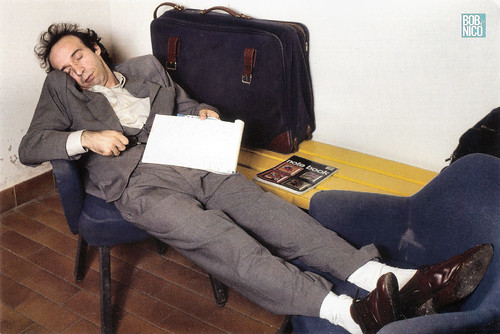
Italian postcard by Cineteca Bologna for the exhibition 'Bob e Nico'. Photo: Mimmo Cattarinich. Roberto Benigni during an interval of the shooting of Il Mostro/The Monster (Roberto Benigni, 1994).
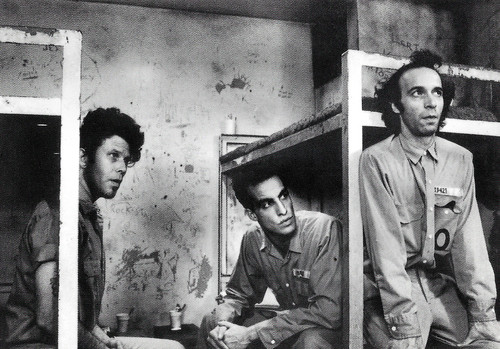
Vintage postcard, no. Z.1071. Tom Waits, John Lurie and Roberto Benigni in Down By Law (Jim Jarmusch, 1986).
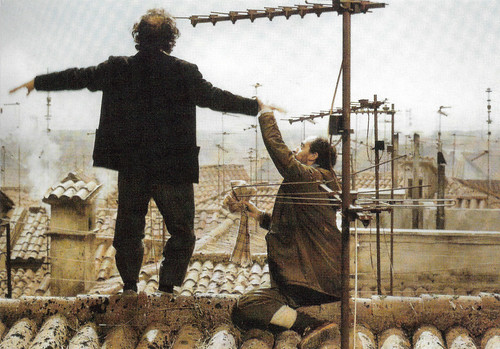
Taiwanese promotion card by CoolCard to promote the exhibition 'Absolute Fellini' (2007). Photo: Roberto Benigni and Angelo Orlando in La Voce della luna/The Voice of the Moon (Federico Fellini, 1990).
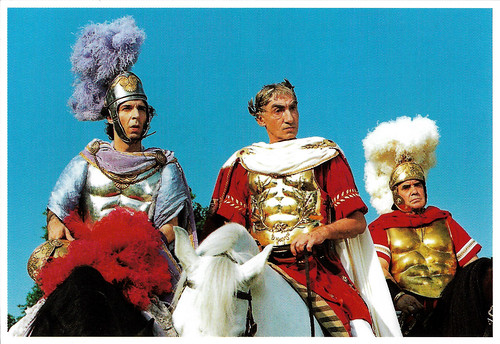
Small French postcard by McCann Communications, Nanterre, offered by AGFA. Photo: Etienne George / Renn Productions. Roberto Benigni, Gottfried John and Jean-Pierre Castaldi in Astérix & Obélix contre César/Asterix and Obelix vs Caesar (Claude Zidi, 1999).
Altar boy
Roberto Remigio Benigni was born in Manciano La Misericordia, Italy, 1952. His parents were Luigi Benigni and Isolina Papini and he has three sisters. His father worked as a farmer, carpenter and bricklayer. He was a prisoner in the concentration camp Bergen-Belsen between 1943 and 1945. Roberto used his stories as the basis for his film La vita è bella (1997). His mother worked as a fabric inspector. Roberto was raised Catholic, served as an altar boy and attended a seminary in Florence, planning to become a priest.
In 1971, he moved to Rome where he took part in some experimental theatre shows, some of which he also directed. In 1975, Benigni had his first theatrical success with the play Cioni Mario di Gaspare fu Giulia (1975), written and directed by Giuseppe Bertolucci. Benigni played Mario Cioni, a character he later resumed in the variety TV series Onda Libera (Renzo Arbore, 1976). Benigni became famous in Italy when he interpreted in Onda Libera the satirical song L'inno del corpo sciolto (The Hymn of the Slippery Body), about the joys of defecation. It caused such a scandal that the censors suspended the series.
Benigni played Mario Cioni again in his first film, the comedy Berlinguer ti voglio bene/Berlinguer, I Love You (Giuseppe Bertolucci, 1977) with Alida Valli as his mother. The title quotes Benigni´s character´s declaration of love for Enrico Berlinguer, then leader of the Italian Communist Party. Later, Benigni appeared during a public political demonstration by the Italian Communist Party. On this occasion, he lifted and cradled Berlinguer, normally a very serious figure. It was an unprecedented but very successful act, which led politicians to exhibit more popular behaviour from that moment on.
His popularity increased with L'altra domenica (1976-1979), another TV show in which Benigni portrays a lazy film critic who never watches the films he's asked to review. In 1979 he had an international success with the symbolic social drama Chiedo asilo/Seeking Asylum (Marco Ferreri, 1979) about a well-meaning teacher and his young pre-school class. The film was entered into the 30th Berlin International Film Festival where it won the Silver Bear - Special Jury Prize. Bernardo Bertolucci cast him in a small speechless role as a window upholsterer in La Luna/Luna (1979) starring Jill Clayburgh.
In 1980 Benigni met actress Nicoletta Braschi, who in 1991 became his wife. She co-starred in his first film as director, the comedy Tu mi turbi/You Upset Me (Roberto Benigni, 1983) and in most of his later films. Next, he played with the popular comic actor Massimo Troisi in Non ci resta che piangere/Nothing Left To Do But Cry (Roberto Benigni, Massimo Troisi, 1984). In this fable, the two protagonists are suddenly thrown back in time to the 15th century, just a little before 1492. They start looking for Christopher Columbus to stop him from discovering the Americas (for very personal love reasons) but are not able to reach him.

Vintage postcard, no. Z.1069. Roberto Benigni, Nicoletta Braschi, Tom Waits and John Lurie in Down By Law (Jim Jarmusch, 1986).
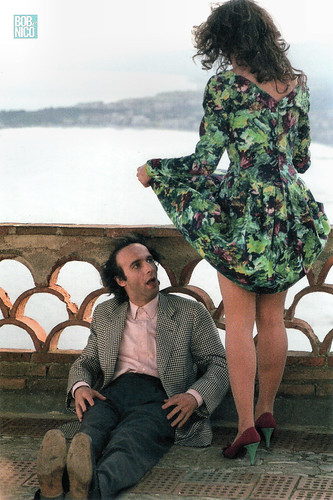
Italian postcard by Cineteca Bologna. Photo: Mario Tursi. Publicity still for Il piccolo diavolo/The Little Devil (Roberto Benigni, 1988) with Nicoletta Braschi.
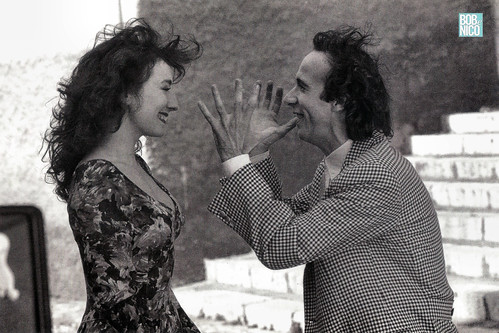
Italian postcard by Cineteca Bologna. Photo: Mario Tursi. Nicoletta Braschi and Roberto Benigni in Il piccolo diavolo/The Little Devil (Roberto Benigni, 1988).

French postcard by DR. Photo: La Cinémathèque Française. Roberto Benigni and Angelo Orlando in La Voce della luna/The Voice of the Moon (Federico Fellini, 1990).
Irrepressible good humour
Roberto Benigni was censored again in the 1980s for calling Pope John Paul II ‘Wojtylaccio’ during a TV show (‘Wojtylaccio’, translates as ‘Bad Wojtyla’, but with a friendly meaning in Tuscan dialect). Benigni starred in three films by American director Jim Jarmusch. In Down By Law (Jim Jarmusch, 1986) he played Bob, an innocent foreigner living in the United States, convicted of manslaughter, whose irrepressible good humour and optimism help him to escape and find love. His co-stars were Tom Waits, John Lurie and Nicoletta Braschi, who of course played his beloved. In Night on Earth (Jim Jarmusch, 1991) he played a cabbie in Rome, who causes his passenger, a priest (Paolo Bonacelli), great discomfort and a fatal heart attack by confessing his bizarre sexual experiences. He also starred in the first of Jarmusch's segments in Coffee and Cigarettes (2003).
In 1988 Benigni began a long-lasting collaboration with screenwriter Vincenzo Cerami. Their first film was Il piccolo diavolo/The Little Devil (Roberto Benigni, 1988) with Walter Matthau. For his part as the little devil, Benigni won the David di Donatello Award for Best Actor. It was the start of a series of comedies that were very popular in Italy, including Johnny Stecchino/Johnny Toothpick (Roberto Benigni, 1992), and Il mostro/The Monster (Roberto Benigni, Yves Attal, 1994). The box-office hit Johnny Stecchino, brought him considerable international attention.
Benigni had a rare serious role in Fellini's last film, La voce della luna/The Voice of the Moon (Federico Fellini, 1989). He also starred in Wim Wenders' Faraway, So Close (1993) and Son of the Pink Panther (Blake Edwards, 1993) as Inspector Clouseau's (Peter Sellers) illegitimate son who is assigned to save the Princess of Lugash. Also in this film are Panther regulars Herbert Lom, Burt Kwouk and a star of the original 1963 film, Claudia Cardinale. The film bombed in the US, but was a hit in Italy.
Outside his homeland, Benigni is probably best known for his tragicomedy La vita è bella/Life Is Beautiful (Roberto Benigni, 1997), also written by Vincenzo Cerami. The film is about an Italian Jewish man who tries to protect his son's innocence during his internment at a Nazi concentration camp, by telling him that the Holocaust is an elaborate game and he must adhere very carefully to the rules to win. Benigni's father had spent three years in a concentration camp in Bergen-Belsen, and La vita è bella is based in part on his father's experiences. Although the story and presentation of the film had been discussed during production with different Jewish groups to limit the offence it might cause, critics accused the film of presenting the Holocaust without much suffering.
La vita è bella was shown at the 1998 Cannes Film Festival and won the Grand Prix. In 1999 Benigni also won the Oscar for Best Actor. The score by Nicola Piovani won another Oscar for Best Original Dramatic Score, and the film was awarded the Oscar for Best Foreign Language Film. Famously, Benigni climbed over and then stood on the backs of the seats in front of him and applauded the audience before proceeding to the stage. After winning his Best Actor Oscar, he said in his acceptance speech, "This is a terrible mistake because I used up all my English!" The film grossed worldwide more than $200 million. He then appeared in the live-action film Astérix & Obélix contre César/Asterix and Obelix vs Caesar (Claude Zidi, 1999), based on Goscinny and Uderzo's Astérix comics and featuring Christian Clavier as Asterix and Gérard Depardieu as Obélix. Benigni played Lucius Detritus, a corrupt Roman provincial governor who wants to kill Julius Caesar.
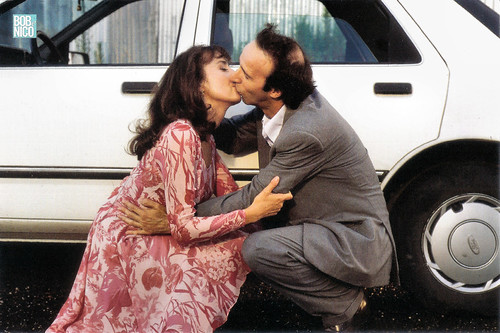
Italian postcard by Cineteca Bologna. Photo: Mimmo Cattarinich. Publicity still for Il Mostro/The Monster (Roberto Benigni, 1994) with Nicoletta Braschi.
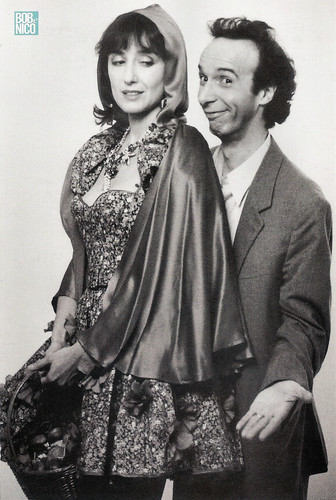
Italian postcard by Cineteca Bologna. Photo: Mimmo Cattarinich. Publicity still for Il Mostro/The Monster (Roberto Benigni, 1994) with Nicoletta Braschi.
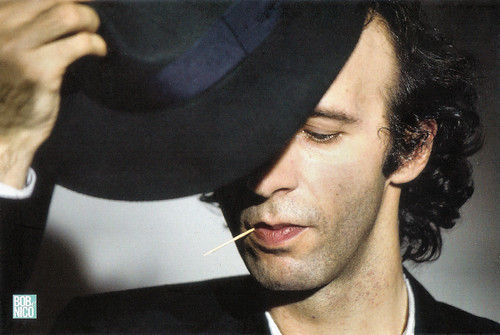
Italian postcard by Cineteca Bologna. Photo: Mimmo Catarinich.

Vintage postcard, no. 6341. Roberto Benigni, Nicoletta Braschi and Giorgio Cantarini in La vita e bella (Roberto Benigni, 1997).
Donatello and Raspberry Awards
Roberto Benigni’s next film, the live-action Pinocchio (Roberto Benigni, 2002) was one of the costliest films in Italian cinema ever. It performed well in Italy, but it bombed in North America. Pinocchio received six nominations at the David di Donatello Awards, winning two, as well as winning one of the two awards it was nominated for at the Italian National Syndicate of Film Journalists. At the 23rd Golden Raspberry Awards, however, Benigni was named as the Worst Actor for his role as Pinocchio.
Benigni gave a typically energetic and revealing interview for Fellini: I'm a Born Liar (Damian Pettigrew, 2002), a cinematic portrait of the maestro that was nominated for Best Documentary at the European Film Awards.
His next film was La tigre e la neve/The Tiger and the Snow (Roberto Benigni, 2005) a romantic comedy set in contemporary Rome and in occupied Baghdad during the Iraq War.
In 2006 and 2007, Benigni toured Italy with his 90-minute one-man show 'TuttoDante' (Everything About Dante). Combining current events and memories of his past narrated with an ironic tone, Benigni then begins a journey of poetry and passion through the world of the Divine Comedy. He performed 'TuttoDante' during 130 shows in Italian piazzas, arenas, and stadiums for about one million spectators. Over 10 million more spectators watched the TV show, Il V canto dell’Inferno/The 5th Song of Hell (2007). In 2008-2009, Benigni brought 'TuttoDante' to the United States and Canada.
His latest film appearance was in a segment of To Rome with Love (Woody Allen, 2012). Benigni played a man who wakes up one morning to discover that he has inexplicably become a national celebrity. To Rome with Love received mixed reviews but was a box office success. In 2019, he starred as Mister Geppetto in Matteo Garrone's adaptation of Pinocchio (2019). Pinocchio was met with positive reviews from critics. It received 15 nominations at the 2020 David di Donatello Awards, nine nominations at the Nastro d'Argento Awards, and two Academy Award nominations. Benigni won the Nastro d'Argento for Best Supporting Actor.

French postcard by Pathé. Photo: Katharina / Renn Productions / TF1 Films Production / Bavaria Entertainment / Canal+. Roberto Benigni in Astérix & Obélix contre César/Asterix and Obelix vs Caesar (Claude Zidi, 1999).
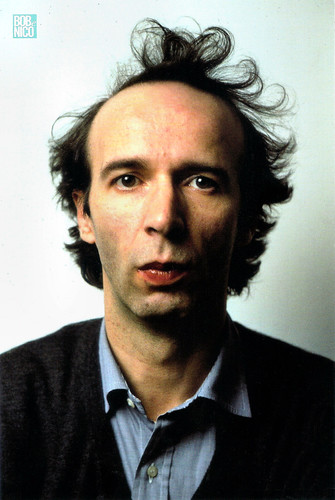
Italian postcard by Cineteca Bologna. Photo: Mimmo Catarinich.

French postcard by Editions Humour à la Carte, Paris, no. A-C 1265. Photo: German poster by Pandora Film. Roberto Benigni, Tom Waits and John Lurie in Down By Law (Jim Jarmusch, 1986).
Sources: Hal Erickson (AllMovie), Wikipedia and IMDb.
No comments:
Post a Comment